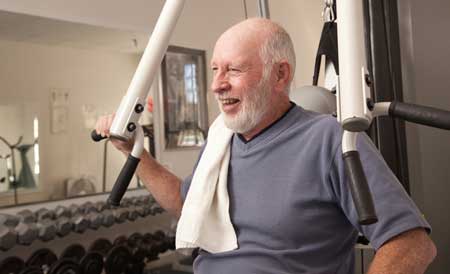Myths About Exercise and Aging
By: Jan Cochrane, RN, BSN, CDE
People often pass along myths or misconceptions from one generation to the next. For instance, your mother may have told you it’s important to wear clean underwear in case of an accident, something she probably learned from her mother. But nurses will tell you that no one in acute care–or anywhere for that matter–even notices something so trivial during the time of an accident!
Here are some myths about exercise and aging that researchers have studied over the years and proven to be wrong:
Myth #1: Older people shouldn’t do demanding activities such as raking leaves or shovelling snow.
First of all, it is difficult to define “older”. There are some 50-year-olds who cannot keep up with 70-year- olds who have an active lifestyle. If you are generally active, doing heavier tasks shouldn’t be a problem. However, if you haven’t been active, start slow. Walking is always a safe way to start.
The great ball player Satchel Paige (1906-1982) once asked this excellent question: “How old would you be if you didn’t know how old you was?”
Myth #2: As you get older, you should avoid lifting heavier objects such as groceries.
Au contraire! This is the time to increase strength in the muscles by exercising at least twice a week. It can be as simple as carrying the laundry or climbing stairs. Remember: “Use it or lose it.”

Myth #3: Don’t exercise if you have heart problems or high blood pressure.
Don’t forget that your heart is a muscle that needs exercise just like all others! If you have had a recent heart attack, check out programs that guide you to getting exercise back into your life. You could be doing more harm by not moving.
One last reminder: “Running late does not count as exercise.”
Learn more from these Active Aging Canada resources:
- Preventing Falls in Older Adults
- The Power of Strength Training for Older Adults
- Exercise for Your Heart’s Sake: It’s Never too Late
About the Author
Jan Cochrane, RN, BSN, CDE, has worked in home care and gerontology. She is a diabetes educator with a passion for encouraging healthy lifestyles.
Click Here for print PDF file – Active living – Myths About Exercise and Aging
Why we need more vitamin B12 as we age?
Next Post
Vitamin D: Bone health and more!

- Categories
Recent Posts

